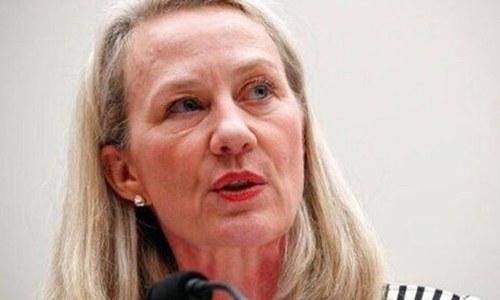Pakistan has rejected US diplomat Alice Wells' claims that the China Pakistan Economic Corridor (CPEC) is financed solely through loans or non-concessional financing with sovereign guarantees.
During the weekly media briefing on Thursday, Foreign Office Spokesperson Aisha Farooqui sought to set the record straight about a growing impression that Pakistan's economy is under tremendous burden from Chinese debt.
"The CPEC debt amounts to $4.9bn which is not even 10 per cent of the country's total debt," she explained.
Farooqui said that the 7,000MW CPEC power projects worth $12.4bn "have reached completion" and that the completion of all other CPEC projects were the government's top priority.
The spokesperson reminded the media that the CPEC "has helped Pakistan to address development gaps in energy, infrastructure, industrialisation and job creation", reported Radio Pakistan.
According to the national broadcaster, she stressed that it should be viewed in terms of "enormous economic benefits for the people of Pakistan and social economic development".
She also highlighted its benefits for "regional connectivity and prosperity".
The Ministry of Planning also issued a response to Wells' remarks. According to a statement by the ministry's spokesperson, "the projects completed so far in Phase-1 have already brought relief and started yielding dividends and tangible socio-economic benefits".
The statement said that the CPEC projects will accelerate development in the country, boosting its economic growth and ushering in prosperity for the people.
"Pakistan being a sovereign state exercises the right to chose economic partners from around the globe on mutually beneficial basis," read the press release.
According to the statement, "all related projects are being pursued as per laws and regulations of Pakistan and through an institutional mechanism wherein transparency is a priority consideration".
"Necessary due diligence with all financial implications is being undertaken before finalisation of any projects," the statement added.
It highlighted that the country's "debt sustainability strategy has an endorsement of International financial institutions".
Earlier in the day, Foreign Minister Shah Mehmood Qureshi said that when it comes to the CPEC, Pakistan has to look out for what is in the country's best interests.
"We will continue to do what is beneficial to us," the foreign minister said in a statement released by his office Thursday morning.
Beijing's warning to Washington
Pakistan's response comes a day after China issued a strongly-worded statement following allegations levelled by US diplomat Ambassador Alice Wells who had said there was no transparency in CPEC projects.
Claiming that Pakistan’s debt burden was growing due to the Chinese financing, Wells had alleged that companies blacklisted by the World Bank had got contracts in the CPEC.
Speaking at an event in Islamabad on Tuesday, Wells had insisted that Chinese money was not assistance. By getting Chinese financing for the projects, Pakistan was buying expensive loans and as a buyer it needed to be aware of what it was doing as this would take a heavy toll on its already struggling economy, she had contended.
A day later, taking strong exception to the senior US diplomat's remarks, the Chinese Embassy in Pakistan had emphatically warned the US against meddling in Pak-China ties and the CPEC.
“We would be more than glad to see the US develop its relationship with Pakistan, but we strongly oppose the US interference in China-Pakistan relations and the CPEC.… we have to make our position clear and reject the negative propaganda by the US. We must not let the truth be distorted and the lies run wild,” the embassy had said in a statement.
“The comments hold nothing new,” the embassy had said and reminded that both China and Pakistan have repeatedly rejected similar insinuations in the past.
“However, the US side still ignores the facts and is obsessed with the story it made for the CPEC,” it had added.
Noting that China “puts Pakistani people’s interests first” in CPEC projects, the embassy had underscored that China and Pakistan staunchly adhere to “principles of mutual consultation and cooperation” for shared benefits.
The embassy had asked the US to let people of Pakistan decide whether or not CPEC suited them instead of judging by itself. It said the 32 CPEC early harvest projects completed over past five years have significantly improved local transportation infrastructure and power supply, created over 75,000 jobs directly and contributed up to two per cent of Pakistan’s GDP growth in Pakistan.
“It shows that CPEC is playing an important role in boosting Pakistan’s socioeconomic development and improving people’s livelihood,” China had asserted.















































